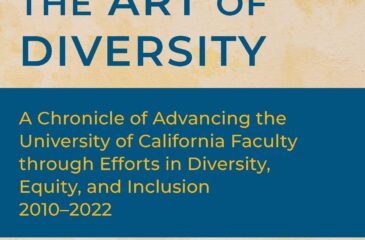UC OSC Blog
-
New Open Access Book from eScholarship Publishing: The Art of Diversity by Susan Carlson
eScholarship Publishing, University of California, announces a new open access book release: The Art of Diversity: A Chronicle of Advancing the University of California Faculty through Efforts in Diversity, Equity, and Inclusion, 2010–2022 by Susan Carlson. In this institutional history, Carlson details the University of California’s systemwide efforts to increase the diversity of its faculty during her tenure as Vice Provost, UC Office of the President. It tells the story of a remarkable alignment of California stakeholders—from the UC Regents and University leaders to the Academic Senate and the California legislature, from small faculty teams to multicampus coalitions—and how they […]
-
California Universities Partner with Wiley on Landmark Open Access Agreement
This post is a press release issued by Wiley, the University of California, and the Statewide California Electronic Library Consortium. Hoboken, NJ – January 11, 2024 – The 10-campus University of California system and 48 private and public academic and research institutions represented by the Statewide California Electronic Library Consortium (SCELC) have reached a new open access agreement with Wiley, one of the world’s largest publishers. The three-year deal begins this month, and will make more research eligible for open access publication than any partnership of its kind in California. “Some of the most groundbreaking research in the world is […]
-
Remarks by Günter Waibel on federal public access policies and institutional investment
The following remarks were made by Günter Waibel, Associate Vice Provost and Executive Director of CDL, at the public workshop “Enhancing Public Access to the Results of Research Supported by the Department of Health and Human Services,” held at the National Academies of Science, Engineering and Medicine in Washington DC, November 30 – December 1, 2023. My name is Günter Waibel, and I am the Executive Director of the California Digital Library at the UC Office of the President. I’ll focus my remarks on the implementation of the 2022 White House OSTP guidance by agencies, publishers and institutions. For publishing, […]
-
Open Book Collective: Collective Path Toward an Open and Sustainable Monograph Future
The Open Access (OA) publishing movement is at our doorstep. However, as an academic community, we are not yet ready to fully embrace and support the OA monograph transformation. Books continue to lag behind journals in terms of OA publishing, infrastructure, and distribution. The Open Book Collective (OBC) provides some key solutions for the existing challenges while charting a new collective path toward an open and sustainable monograph future. The proliferation of OA policy mandates and library-funded OA pilots led by academic publishers or scholar-led presses combined with recent developments in infrastructural support for OA book publishing are important milestones […]
-
New UC publishing resource: Diversity, Equity, and Inclusion in Scholarly Communication
The Office of Scholarly Communication (OSC) at the University of California announces the launch of its new Diversity, Equity, and Inclusion in Scholarly Communication resource. This site supports the UC community in gaining a deeper understanding of the challenges of achieving and maintaining diversity, equity, and inclusion in scholarly publishing, including concrete actions for authors, peer reviewers, journal editors, and librarians. Some example actions that can be taken: Find many more suggested actions in the OSC DEI resource. “This website is relevant and urgent,” asserts Douglas Haynes, Vice Provost for Academic Personnel and Programs at the UC Office of the […]
-
UC to End Funding Support for Open Access Publishing with IEEE in 2024; Reading Access Will Continue
The University of California will end open access publishing support through its agreement with IEEE effective January 1, 2024. The UC libraries’ funding support for page charges will also end at that time. Reading access to IEEE publications will continue without interruption — essentially reverting to the type of agreement UC had with IEEE prior to the open access publishing pilot. Since the pilot agreement began in July 2022, only 20 percent of UC authors publishing with IEEE have chosen to publish open access — far fewer than with UC’s other open access agreements — and of those who chose […]
-
Make your collected works openly available in eScholarship!
The UC OA policies have been helping authors make their work available online for over ten years, but what about publications that predate these policies? Authors with publication lists spanning many decades need additional tools to ensure that their collected works are publicly archived. They may have questions like “Where can I share these?” or “Is it a copyright problem to share them?” or even “I don’t have a copy, how do I find this?” There is now a toolkit on the OSC site to help authors work through these questions and more, with the goal of ultimately providing access […]
-
UC advocates for author rights in open access publishing agreements
This article was originally published on UCnet on August 17, 2023. UC has recently learned that academic publishers are attempting to subvert the rights of authors to control how their own work is used and shared. Through licensing agreements that authors are required to sign, some publishers even attempt to place restrictions on earlier drafts and supporting data — flying directly in the face of UC’s principles and values. “We are disappointed to learn that publishers are deliberately undermining the stated will of UC faculty,” wrote UC President Michael V. Drake, M.D., and UC System Provost and Executive Vice President […]
-
New pilot open access agreement between the University of California and Frontiers
The University of California (UC) and Frontiers today announced a one-year open access pilot agreement that will make it easier and more affordable for UC researchers to publish in one of twenty selected Frontiers journals in the humanities, social sciences, and sustainability. The new agreement with Frontiers, one of the world’s leading native open access publishers, advances the university’s efforts to empower more of its authors to share their research freely with the world. “I applaud UC’s new pilot agreement with Frontiers and, in particular, its acknowledgement of the need for increased funding and support for UC authors who publish […]
-
Journal of Right-Wing Studies Launches on eScholarship “in a period of extraordinary right-wing mobilization across the globe”
The eScholarship Publishing program of the University of California is proud to announce the publication of the first issue of the Journal of Right-Wing Studies (JRWS), an open access, nonideological journal that “seeks to promote research, dialogue, and debate on all aspects of right-wing politics, past and present, in the West and around the globe.” JRWS is operated by UC Berkeley’s Center for Right-Wing Studies, which has, over the past fourteen years, become an important hub for scholars and institutions. In his inaugural editorial, the journal’s editor in chief Larry Rosenthal states, “We are launching the journal in a period […]





